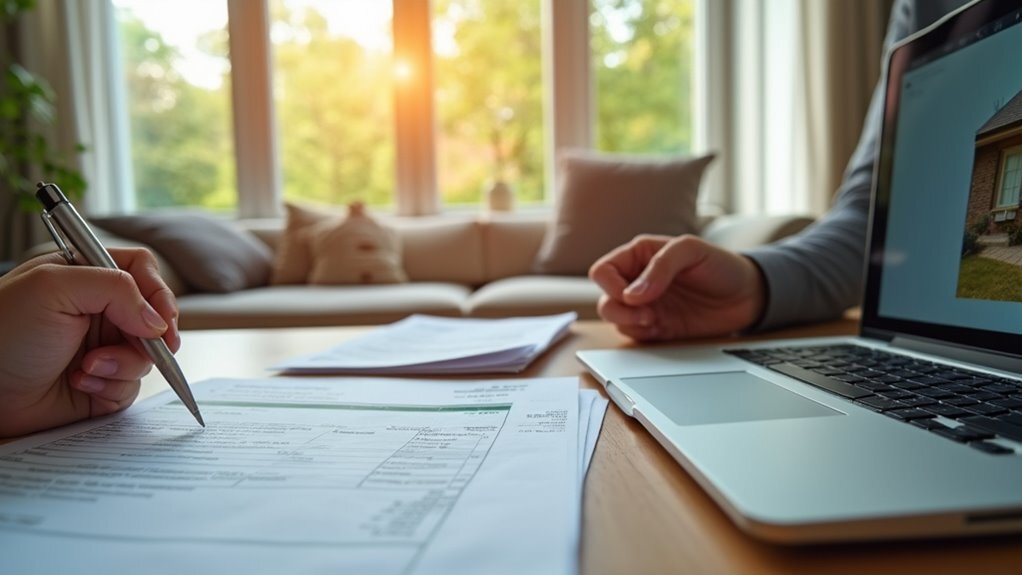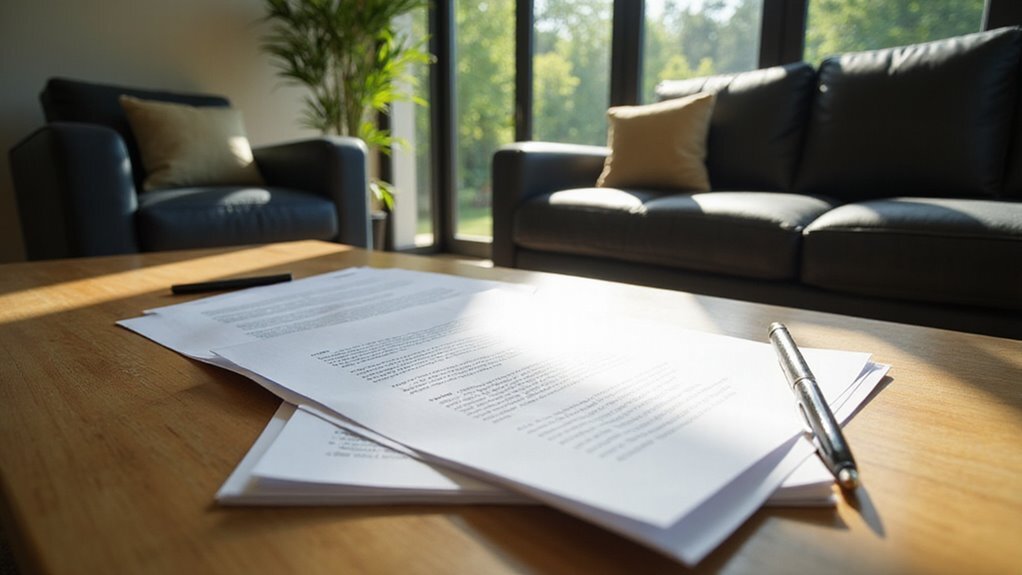Caught between mortgage payments and a home sale, many homeowners find themselves in financial limbo. Missing payments while waiting for closing can damage credit scores and trigger penalties. Understanding your mortgage obligations during this transition provides clarity and protects your financial standing.
Yes, you must continue paying your mortgage while selling your house until the sale officially closes. Your mortgage obligation remains active until the lender receives full payment and releases the lien on your property.
In this blog I will explore everything about mortgage responsibilities during the home selling process.
Key Takeaways
- Mortgage payments must continue until the sale closes and the lender releases the lien after receiving full payoff.
- Request a payoff statement from your lender to determine the exact remaining balance before closing.
- You are responsible for paying the mortgage until the property transfer is finalized, regardless of the sale process.
- If behind on payments, lender approval is needed for short sales or selling underwater properties.
- The sale proceeds are used to settle the remaining mortgage balance at closing, ensuring all obligations are met.
What Happens to Your Mortgage When Selling Your House?

Your mortgage must be paid off when you sell your home. Continue making payments until the sale closes. The money from your home sale will pay off your remaining loan balance.
Request a payoff statement from your lender before closing. This document shows the exact amount needed to satisfy your debt. It includes the principal balance plus any accrued interest.
You remain responsible for all mortgage obligations until the transaction completes. After closing, your lender will release the lien on your property. The title then transfers to the new owner free of your mortgage.
Do You Still Pay Mortgage During the Home Sale Process?

Yes, you must continue paying your mortgage until closing day. The remaining balance gets paid from the sale proceeds.
Your payment obligations remain unchanged during the listing and offer periods. Skipping payments can damage your credit score and trigger penalties.
Lenders require full repayment of the outstanding loan amount when ownership transfers.
Before closing, request a payoff verification statement from your lender. This document shows the exact amount needed to settle your mortgage completely. Your closing agent will handle the final payment using funds from the sale.
How to Manage Your Mortgage While Selling Your Home?

To manage your mortgage during the sale, start by understanding your current balance and requesting a payoff statement from your lender.
You should keep making regular payments and time them to cover your closing date, ensuring no interest accrues unnecessarily.
Also, maintain clear communication with your lender to confirm payoff details and get written confirmation once the sale is complete.
Understanding Your Current Mortgage Balance
Your mortgage balance is the total amount you still owe on your home loan. Contact your lender to request an official payoff statement. This document shows your exact remaining balance including interest and fees.
Most lenders provide payoff statements within 3-7 business days after receiving your request. Payoff statements typically remain valid for 30 days.
Keep making regular payments until closing to avoid penalties or interest charges. As a result, you’ll have a clear picture of how much of your sale proceeds will go toward paying off your mortgage. Always verify that the final amount covers all remaining debt before closing.
Timing Mortgage Payments During the Sale
Continue making mortgage payments until your home sale closes. Missing payments can derail your sale and damage your credit score.
Contact your lender early to request a payoff statement showing the exact amount needed to satisfy your loan. This document typically includes the remaining principal balance plus any interest or fees.
Your closing agent will coordinate the final payoff during settlement. Lenders usually require payment within 10-30 days of issuing the payoff statement.
After closing, your lender will release the lien on your property, officially completing your mortgage obligation.
Communicating with Your Lender
Tell your lender about your home sale as early as possible. This prevents complications and ensures a smooth transaction. Your lender needs time to prepare necessary documents.
Contact your lender for a current payoff amount before closing day. The payoff figure will include your remaining loan balance plus any interest or fees. Additionally, request this information in writing for your records.
Make your selling intentions clear from the start. Your lender should confirm they’ll release the property lien after receiving payment. This confirmation protects you from future claims against the property.
What Are Your Options for Handling the Existing Mortgage?
You have several options for handling your existing mortgage when selling your house.
You can pay it off in full, investigate the possibility of a mortgage assumption by the buyer, or consider a short sale if the home’s value is less than the remaining balance.
Loan portability is rarely an option, so understanding these choices helps you plan effectively.
Paying Off the Mortgage in Full
Yes, you must pay off your existing mortgage when selling your home. This creates a clear title for the new buyer.
Request a payoff statement from your lender before closing. The statement shows the exact amount needed to clear your debt.
Sale proceeds typically cover the remaining mortgage balance at closing. Your lender will provide a satisfaction document after payment.
Don’t forget about any home equity loans or second mortgages. These must also be paid in full.
The title company handles most of this process during closing. Complete payoff ensures legal compliance and prevents future ownership disputes.
Mortgage Assumption by the Buyer
Yes, a buyer can take over your existing mortgage. This process saves money on interest and reduces closing costs. Not all mortgages allow assumption.
Check your loan documents or ask your lender about assumption eligibility. The buyer must qualify financially with your lender. You’ll need proper documentation releasing you from the mortgage obligation.
Until this release is finalized, you remain liable for the loan. In addition, the buyer must meet the lender’s credit requirements. This arrangement benefits both parties when interest rates have risen since your original mortgage.
Short Sale Considerations
A short sale allows you to sell your home when you owe more on your mortgage than its market value. This process requires lender approval before proceeding.
You must prove financial hardship to your lender to justify the short sale request. Lenders typically require documentation showing your inability to pay the full mortgage amount.
The negotiation may include conditions. Your lender might ask you to contribute toward the difference between sale price and loan balance.
Expect a longer timeline compared to traditional sales. Approval processes often take 30-60 days or more.
Multiple departments must review your application before authorizing the transaction. Additionally, credit impacts vary by situation.
Loan Portability Options
You can transfer your existing mortgage to a new property with loan portability. This option saves money and simplifies the mortgage process during a sale. Not all loans qualify for this feature. You should verify your lender’s specific policies before making plans.
Good credit is required to qualify for most loan portability programs. Early payoff penalties may apply if you can’t port your loan.
Contact your lender early to discuss available options. This conversation helps avoid unexpected costs later.
The table shows three main approaches: paying off completely, mortgage assumption by the buyer, or transferring your existing loan to a new property.
Can You Sell a House If You’re Behind on Mortgage Payments?
Yes, you can sell your house while behind on mortgage payments. The process requires extra steps and lender involvement.
Your lender must approve the sale if you can’t pay off your full loan balance. A short sale might be necessary when your home value falls below your loan amount. Late payments may trigger foreclosure proceedings if you don’t act quickly.
For underwater properties, lenders typically require proof of financial hardship. The bank reviews your finances and sale price before giving approval. This process often takes longer than standard home sales.
Always communicate with your mortgage company to explore all options. Professional guidance from a real estate attorney can protect your interests.
What Closing Costs Should Sellers Expect with a Mortgage?
When selling your home with a mortgage, you’ll face several closing costs. These include title insurance and transfer fees, prepayment penalties if applicable, and prorated interest through the closing date.
Additionally, you must settle any outstanding property taxes and ensure all liens are cleared before the sale completes.
Title Insurance and Transfer Fees
Title insurance and transfer fees typically cost 3-6% of your home’s sale price. Title insurance protects you against property ownership disputes and ranges from $1,000-$2,000.
Transfer fees vary based on your location and can significantly affect your total costs. Always check your closing disclosure document before finalizing the sale.
These expenses are standard parts of real estate transactions. Before closing, set aside funds specifically for these fees.
Local regulations determine exact transfer fee amounts, so research your area’s requirements early. In addition to this, working with an experienced title company can help prevent unexpected issues.
Mortgage Prepayment Penalties
Prepayment penalties are fees charged when you pay off your mortgage early. These fees typically range from 1-2% of your remaining loan balance.
Lenders impose these penalties to recover interest they expected to earn over the life of your loan. Check your loan documents for specific penalty terms before selling your home.
Most modern mortgages no longer include these penalties. FHA, VA, and USDA loans specifically prohibit prepayment penalties by law.
Conventional loans might still include them during the first 3-5 years. To avoid unexpected costs, request a payoff statement from your lender. This document will outline any penalties you might face when closing.
Prorated Interest Calculations
Prorated interest covers the days between your last mortgage payment and closing. Your lender calculates this using your daily interest rate times the number of days since your last payment. This amount becomes part of your final mortgage payoff figure.
The calculation ensures you pay interest only for the exact time you owned the property. Your closing date impacts the total interest due. If your closing date shifts, the prorated amount will adjust accordingly.
Lenders include this interest in your closing statement for transparency. The funds transfer directly to your mortgage company during settlement.
Outstanding Property Tax Adjustments
You must pay any outstanding property taxes before selling your home with a mortgage. These taxes get settled at closing. The sale date determines how current tax bills split between you and the buyer.
Sellers remain responsible for all past-due property taxes. Tax proration divides the current year’s taxes based on ownership period. Your lender may hold tax money in escrow that adjusts during payoff.
The closing agent handles these calculations automatically. Your final settlement statement will show exactly what you owe for taxes.
How to Sell Your Home Fast When You Have a Mortgage?
You can sell a home with a mortgage by understanding your payoff amount and creating buyer appeal. First, request a current mortgage payoff statement from your lender.
The payoff statement shows exactly how much you owe and any prepayment penalties. Set a competitive price based on recent comparable sales in your area.
Find a real estate agent with experience handling mortgaged property sales. The agent can guide you through disclosure requirements and negotiation strategies.
Make essential repairs to address obvious problems that might deter buyers. Fresh paint and decluttering also help prospective buyers envision themselves in the space.
Meanwhile, prepare necessary documents to speed up the closing process once you receive an offer.
Ready to Sell Your Home Without Mortgage Stress? Contact OC Real Estate Today
OC Real Estate can help you sell your home without mortgage stress. We eliminate complications during the selling process to protect your financial future. Our team works directly with real estate attorneys to handle mortgage payoff procedures. You’ll understand exactly how mortgage interest affects your sale proceeds.
We focus on maximizing your home equity after the sale is complete. The selling process becomes simple when you have experts managing the details. Throughout the transaction, your financial interests remain our priority. Contact us today to begin your stress-free home selling journey.
Frequently Asked Questions
Do You Still Have to Pay a Mortgage if You Are Selling Your House?
Yes, you must continue paying your mortgage until closing, ensuring the lender is paid in full with proceeds, and avoiding penalties or credit damage.
How to Avoid Mortgage Penalty When Selling?
To avoid mortgage penalties when selling, plan your sale after the prepayment penalty period, request a payoff statement from your lender, and negotiate for a waiver if possible. Timing and communication are key to minimizing costs.
How Is My Mortgage Paid off When I Sell My House?
When you sell your house, you pay off your mortgage directly from the sale proceeds at closing. You continue making payments until then, ensuring the lender receives the full payoff amount, releasing the lien before transferring ownership.

